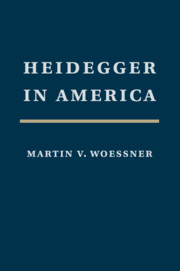Book contents
- Frontmatter
- Contents
- Preface
- Introduction: Being Here
- 1 Freiburg Bound
- 2 Exiles and Emissaries
- 3 Nihilism, Nothingness, and God
- 4 An Officer and a Philosopher
- 5 Dasein and das Man
- 6 The Continental Divide
- 7 Richard Rorty and the Riddle of the Book that Never Was
- 8 Ethics, Technology, and Memory
- 9 Culture Wars
- Conclusion: Being There
- Index
- References
9 - Culture Wars
Heidegger and the Politics of Postmodernism
Published online by Cambridge University Press: 04 February 2011
- Frontmatter
- Contents
- Preface
- Introduction: Being Here
- 1 Freiburg Bound
- 2 Exiles and Emissaries
- 3 Nihilism, Nothingness, and God
- 4 An Officer and a Philosopher
- 5 Dasein and das Man
- 6 The Continental Divide
- 7 Richard Rorty and the Riddle of the Book that Never Was
- 8 Ethics, Technology, and Memory
- 9 Culture Wars
- Conclusion: Being There
- Index
- References
Summary
Always historicize!
Fredric JamesonIn his foreword to The Closing of the American Mind, Saul Bellow described his friend Allan Bloom, the author of that surprise best-seller, as “a frontline fighter in the mental wars of our time.” Just a few pages later, in his preface, Bloom suggests that his “book is to be taken as a report from the front.” The battlefield metaphors – like Heidegger's re-appropriation of the language of the Fronterlebnis in Being and Time – were not accidental. When the book appeared, in 1987, the so-called culture wars were raging in the United States. It was possible and all too common at that time to come across such rhetoric of armed partisanship almost everywhere, even though the debates, far from being matters of life and death, contained their fair share of farce. Whether they concerned struggles over National Endowment for the Humanities' funding, pornography, canon (re)formation, or multiculturalism, the culture wars of the 1980s and 1990s, which spilled over into the new century, profoundly altered the intellectual climate of the United States.
At the eye of the storm was theory. As Bloom warned his readers, a new wave of ideas, many of them originating in Europe, seemed to be flooding the American academy. The fact that Heidegger's work may have influenced this new wave meant that he would undergo at least one more round of intense re-reading and reception.
- Type
- Chapter
- Information
- Heidegger in America , pp. 263 - 279Publisher: Cambridge University PressPrint publication year: 2010



